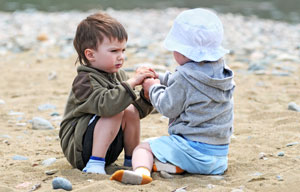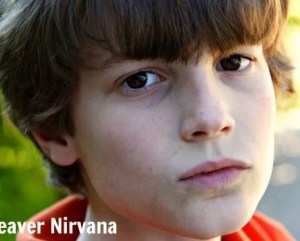Growing up is an interesting and precarious undertaking. When we are born, we cannot tell the difference between our self and our caretakers. Being fed, being changed, and being held, are all events that we assume (with whatever ability of assumption we have at this early stage of development) occur because we will them to happen. Our awareness, at this time, is in the present moment. We become aware of a need because of the discomfort it causes; and we respond to the discomfort by loudly protesting the condition of discomfort; we cry. If we are lucky, a nurturing caretaker quickly satisfies our need. If this happens routinely, we associate simply having a need with having that need met. Our response to having an unfulfilled need becomes the catalyst that sets our caregivers into motion, as though our needs control their behaviors. As infants, we are self-centered and focused on pleasure and the avoidance of discomfort. Nothing else.
By the time we reach the ripe old age of toddlerhood, we begin to recognize that there is a difference between our self and others. This is when we learn perhaps the most important words in the English language if we are to embrace ourselves as separate, autonomous individuals. The first word is “NO!” Other words of premium importance that we learn to use at this age are: “It is mine!” and “I do it!” Saying these words provides us with a sense of personal power and agency that we intuitively know is essential to our well-being. We understand that our survival ultimately depends upon our being able to direct our own behaviors, and we are willing and anxious to develop the independence that would eventually lead to complete emancipation from our caretakers.
Then (as a product of our parents’ well-intentioned desires to nurture us and help us grow), we were dutifully taught that it was not okay for us to use these tools of our emerging independence and sense of separateness; of personhood. Instead, we (especially girls) were taught to “Be nice.” Instead of being allowed to assert ourselves by saying “No,” we were taught to take other’s needs into consideration. When we said “It is mine” we were taught that we had to share. When we asserted ourselves by saying “I do it!” We were told, “Let me help you.” We may have even been punished for continuing to assert ourselves instead of taking the correction, especially if we had an especially strong will.

“Yes,” you say, “but we must teach our children to be polite. We must teach them to share. We must teach them that it is not OK to say ‘No!’ because it is disrespectful.” On these points I agree, but only to the extent that the principles of politeness and social grace teach socially appropriate behavior without sacrificing a girl’s sense of self. At what point do we dismiss conventional wisdom about being polite, and teach our female children to honor themselves? At what point do we decide that when our child says “No” it is not rude, but rather a wonderful assertion of her own needs that deserves VALIDATION?! Is it possible, that from our early training, we began learning the process of making our own needs secondary to those of others?
In contrast, consider the training of little boys, who were encouraged to play competitively and aggressively. The toughest, most aggressive boy “wins.” He didn’t ask for what he needed; he took it and was praised for being strong and “all boy”! Perhaps, that is the beginning of where healthy men learn to balance their own needs with the needs of others. At some point, they had to learn that if they are too aggressive, other children would not play with them. Consequently, they learned to balance their own needs with their need to get along with others. They already came to relationships knowing how to assert their own needs, but learned to soften their demands in order to maintain a relationship. The boys who grew up to become abusive men never learned that lesson; they got stuck at the “I have to win” part of the game. Either way, it appears that boys begin their training early for being able to “hold onto themselves” within the context of a relationship.

By pointing to some of the differences in training between girls and boys, I am not suggesting that we encourage girls to play in the same way as boys do. I am, however, suggesting that because of differences in early training, girls and women are required to address the developmental task of attaining personhood as an ongoing process which requires balance between the pressure to be “nice” or “polite” and the requirement to care for their own needs as people. I believe that we can do this by encouraging our little girls to listen to and to honor their own experiences. And letting them say no. 
Putting others’ feelings first when the lessons I’ve discussed here can lead to questions like the one answered in this podcast episode: He’s wonderful 90% of the time, can the 10% of the time “anger problem” that he has be resolved in therapy or is it fruitless to hold out hope?
In cooperation with 2bsisters, Tamara is in the process of making her recovery curriculum for domestic violence survivors available via a protected online format. This curriculum is for victims who have not yet been able to escape, those who have recently escaped and those who have been independent for a time but still need to strengthen themselves as survivors.
© Tamara Bess, LMFT 2014 All Rights Reserved. Any use of this article without Tamara’s express written permission is prohibited.





